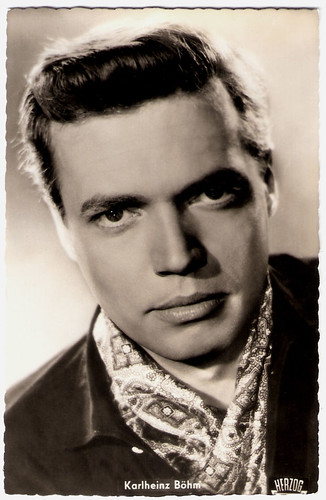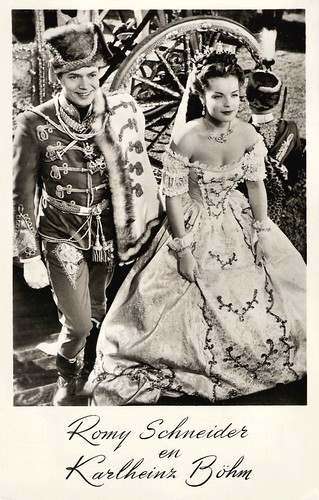Dutch postcard by Gebr. Spanjersberg N.V., Rotterdam; licency holder of Ufa, Berlin; no. 1004. Photo: Ufa.

Dutch postcard by Kolibri, Wormerveer, no. 2168. Photo: Rhombus / Herzog-Film / Czerwonski.
German postcard by Kolibri-Verlag G.m.b.H., Minden (Westf.), no. F 15. Retail price: 25 Pf. Photo: Herzog-Film.

German postcard by Kolibri-Verlag, no. 1447. Photo: Berolina / Constantin-Film / Wesel. Ulla Jacobsson and Karlheinz Böhm in Die heilige Lüge/Saintly Lie (Wolfgang Liebeneiner, 1954).
German postcard by Universum-Film Aktiengesellschaft, Berlin-Tempelhof, no. CK-28. Retail price: 30 Pfg. Photo: Arthur Grimm / UFA.
Elegant young lover
Karlheinz Böhm (sometimes Carl Boehm) was born in Darmstadt, Germany in 1928. His father was the conductor Karl Böhm and his mother the soprano Thea Linhart.
Karlheinz started his career in 1948 as an assistant director of Der Engel mit der Posaune/The Angel with the Trumpet (Karl Hartl, 1948), in which he also played a small part. Later he attended the actor's training at the Burgtheater and subsequently became a member of the ensemble.
In 1952, Karl Hartl brought him to Munich for Haus des Lebens/House of Life (Karl Hartl, 1952) starring Gustav Fröhlich.
In the following decade, Böhm appeared in more than 30 films. His first success was his role as the elegant young lover of Alraune/Mandrake (Arthur Maria Rabenalt, 1952) starring Hildegard Knef.
Then he often appeared as a sincere and respectable young man in films like Salto Mortale (Victor Tourjansky, 1953) with Margot Hielscher, and Ich war ein häßliches Mädchen/I Was an Ugly Girl (Wolfgang Liebeneiner, 1955) featuring beautiful Sonja Ziemann.
Dutch Postcard, no. F 213.

Dutch postcard by Takken, Utrecht, no. 2064.
Dutch postcard by Uitg. Takken, Utrecht, no. 3720. Photo: ERMA-Herzog-film-Wien. Publicity still for Sissi - Schicksalsjahre einer Kaiserin/Sissi: The Fateful Years of an Empress (Ernst Marischka, 1957).

Dutch postcard by Gebr. Spanjersberg, Rotterdam, no. [.061]. Photo: Ufa. Spanjersberg was at the time the Dutch licence holder of Ufa/Film-Foto. Romy Schneider and Karlheinz Böhm in Sissi - Schicksalsjahre einer Kaiserin Sissi/Sissi - Fateful Years of an Empress (1957) written and directed by Austrian Ernst Marischka.
A serious image problem
Hugely popular were the three Sissi films. Karlheinz Böhm and Romy Schneider formed the perfect couple of German films in the 1950s.
During the shooting of the first episode, Sissi (Ernst Marischka, 1955), the then 16-year-old Schneider used to call him 'Uncle Karlheinz', although he was just 12 years her senior.
The sequels were Sissi - Die junge Kaiserin/Sissi: The Young Empress (Ernst Marischka, 1956) and Sissi - Schicksalsjahre einer Kaiserin/Sissi: The Fateful Years of an Empress (Ernst Marischka, 1957).
More stiff juvenile hero parts followed in films like Das Schloß in Tirol/Castle in Tyrol (Géza von Radványi, 1957) opposite Erika Remberg, and Das Dreimäderlhaus/The House of the Three Girls (Ernst Marischka, 1958) with Johanna Matz.
They left Böhm with a serious image problem. He attempted a change in international films, but with his first British film, he succeeded almost too well.
Dutch postcard by N.V. Int. Filmpers (I.F.P.), Amsterdam, no. 1027.
Dutch postcard printed by Takken, Utrecht, no. AX 1980. Photo by Filmex N.V.
Dutch publicity photo by Filmex. Still for Sissi - Die junge Kaiserin (1956) with Vilma Degischer.
Voyeur
Outside of Europe, Karlheinz Böhm is probably best known for his role as the psychopathic voyeur and serial killer Mark in Peeping Tom (Michael Powell, 1960).
The film received slating reviews by British and German critics, but it was re-examined 20 years later and is nowadays considered a masterpiece.
Böhm subsequently appeared with Jayne Mansfield in the striptease thriller Too Hot to Handle (Terence Young, 1959) and the French thriller La Croix des vivants/Cross of the Living (Ivan Govar, 1960) with Pascale Petit.
Next he appeared as the Nazi-sympathizing son of Lee J. Cobb in the remake of The Four Horsemen of the Apocalypse (Vincente Minnelli, 1963).
In Hollywood, he also played Jakob Grimm in the Cinerama spectacular The Wonderful World of the Brothers Grimm (Henry Levin, 1963), Ludwig van Beethoven in the Disney production The Magnificent Rebel (Georg Tressler, 1962) and a sadistic agent in The Venetian Affair (Jerry Thorpe) with Robert Vaughn.
German postcard by Kolibri-Verlag, no. 665. Photo: Helios / Schorchtfilm. Still for Haus des Lebens/House of Life (Karl Hartl, 1952).

German postcard by F.J. Rüdel, Filmpostkartenverlag, Hamburg-Bergedorf, no. 628. Photo: Rotary / Deutsche London / Hämmerer. Publicity still for Arlette erobert Paris/ Arlette Conquers Paris (Viktor Tourjansky, 1953).
German postcard by F.J. Rüdel, Filmpostkartenverlag (Rüdel-Verlag), Hamburg-Bergedorf, no. 1294. Photo: Berolina / Constantin / Wesel. Publicity still for Die heilige Lüge/Sacred Lie (Wolfgang Liebeneiner, 1954).
Dutch postcard by Uitg. Takken, Utrecht, no. 1961. Photo: Filmex-Herzog. Still for Kitty und die Grosse Welt (Alfred Weidenmann, 1956).
Ethiopia
In the mid-1960s Karlheinz Böhm moved to Italy and focussed more on his theatre work. In 1964, he made his debut as a director of opera productions. A second German film career began in 1972 when Rainer Werner Fassbinder made full use of Böhm's by now many-layered star image.
He first cast him as the worldly-wise Prussian councillor Wüllersdorf in Fontane - Effi Briest/Effi Briest (1974) opposite Hanna Schygulla, and then as the sadistic husband of Margit Carstensen in the TV thriller Martha (1974). Böhm played a homosexual art dealer in Fassbinder's Faustrecht der Freiheit/Fox and His Friends (1975), and finally, the arrogant, middle-class communist Tillmann in Mutter Küsters Fahrt zum Himmel/Mother Küsters Goes to Heaven (1975) featuring Brigitte Mira.
Later, Böhm was mainly appearing on stage or in TV productions. After losing a bet on the popular German TV show Wetten, dass..? (You Bet That..?) (1981), he founded the charity organization Menschen für Menschen (People For People). For over 30 years, Karlheinz Böhm promoted charities for starving children in Central Africa and Ethiopia.
He was the father of Sissi Böhm (born in 1955) from his first wife Elisabeth Zonewa; Kristina (1959), Michael (1960) and Daniela (1961) from his second wife actress Gudula Blau, and actress Katharina Böhm (1964) from his third wife Barbara Lass.
His fourth wife, Almaz Böhm, a native of Ethiopia, gave birth to their children Nicolas (1990) and Aida (1993). Actor Florian Böhm (1978) is his grandson. Karlheinz Böhm died in Grödig, Salzburg, Austria. He was 86.
German postcard by Kolibri-Verlag, no. 2773.
German postcard by WS-Druck, no. F 139. Retail price: 30 Pfg. (Edges cut off).
German postcard by UFA, no. CK-126. Retail price: 30 Pfg. Photo: UFA. Collection: Geoffrey Donaldson Institute.
Sources: Encyclopedia of European Cinema, Filmportal.de, Wikipedia and IMDb.
This post was last updated on 13 June 2023.
3 comments:
An amazing story...what a career!
He is a excellent actor, but mostly an outstanding human being. His work for the people of Ethiopia will be his legacy.
Yes, he is one of Germany's real stars of the post-war era. Handsome, a great actor with a diverse career, and sa man with his heart in the right place. Thanks for your comments.
Post a Comment